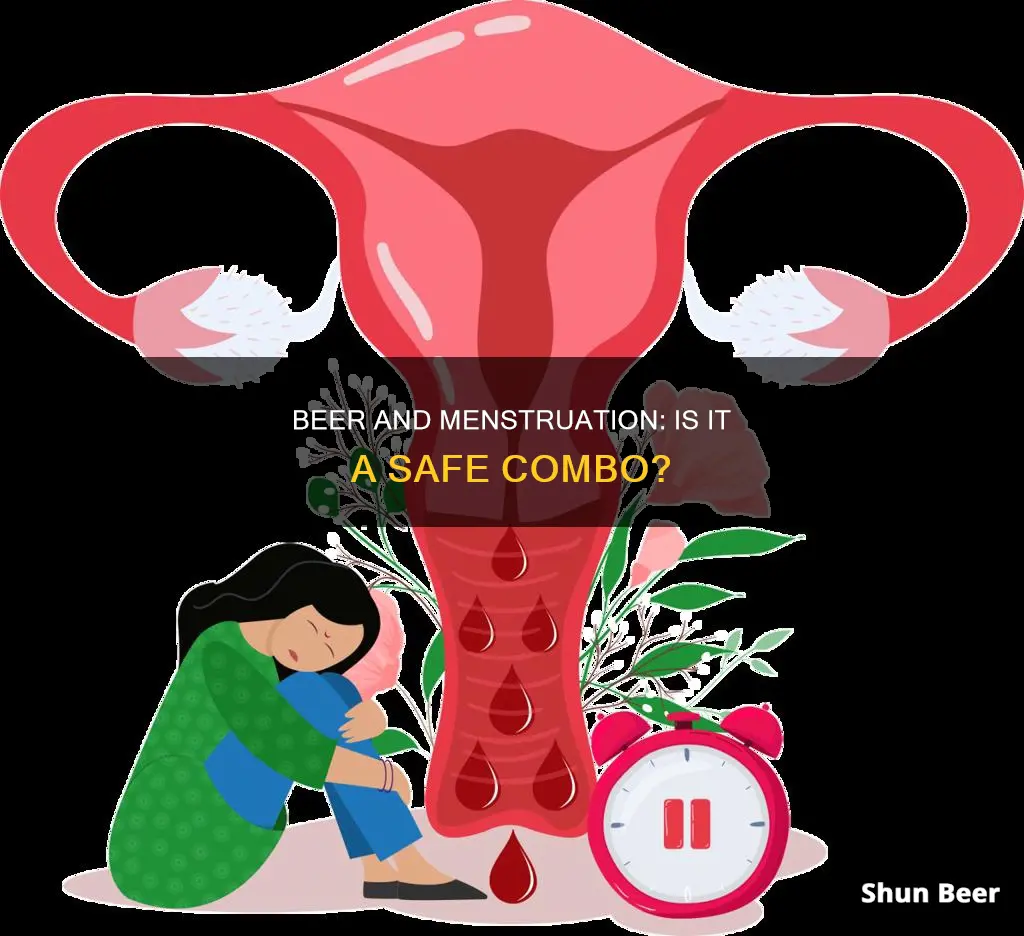
Drinking alcohol during your period is a topic that has raised several questions. While there is no harm in drinking during your period, it is good to be aware of the possible side effects. Alcohol can adversely impact your hormone levels, increasing the production of estrogen and testosterone in the body. This can lead to irregular or missed periods, especially when consumed in high doses. It can also worsen cramps and PMS symptoms such as mood swings and irritability. Alcohol is a diuretic, which means it increases urination and can cause dehydration, making cramps worse. It is recommended to alternate alcoholic drinks with water to stay hydrated. Drinking during the luteal phase might have a noticeable impact on your mood, intensifying the highs and lows. Alcohol can also affect fertility, even in light consumption, and it is advisable to avoid it if trying to conceive. While there is no harm in a few drinks, it is important to be aware of these side effects and drink in moderation.
| Characteristics | Values |
|---|---|
| Can you drink during your period? | Yes, but it can adversely impact hormone levels and worsen PMS symptoms. |
| How much you can drink | Everybody is different, but alcohol tolerance is generally lower during the period. |
| Can alcohol consumption cause cycle irregularities or disorders? | Regular drinking can cause hormonal fluctuations that can lead to irregular ovulation and periods. |
| Does alcohol help cramps? | Alcohol is a diuretic, which can worsen cramps due to dehydration. |
| What to drink on your period | It is recommended to avoid caffeine and opt for water, tea, or juice. |
| Does drinking alcohol affect fertility? | Alcohol can negatively affect fertility by causing irregular or absent ovulation. |
What You'll Learn
- Alcohol can increase the production of estrogen and testosterone, exacerbating PMS symptoms
- Alcohol can worsen cramps by impacting the balance of prostaglandins
- Drinking during your period may lower your alcohol tolerance
- Regular drinking can cause hormonal fluctuations, leading to irregular ovulation and periods
- Alcohol is a diuretic, which can worsen cramps and PMS symptoms

Alcohol can increase the production of estrogen and testosterone, exacerbating PMS symptoms
Alcohol can have a negative impact on almost every aspect of your health, including your hormone health. Drinking excessively can cause short-term and long-term changes to many hormones in your body, including estrogen and testosterone.
Estrogen and testosterone are the two main hormones in the body. They are synthesised in the ovaries and testes, respectively, and affect various reproductive functions. In women, hormones perform many functions, including regulating the menstrual cycle. In men, they are responsible for aspects of male sexual behaviour and sperm development.
When you drink alcohol, it can disrupt the production of testosterone by interfering with the hypothalamus, anterior pituitary gland, and the testes. This can lead to low testosterone levels, which can cause erectile dysfunction and low sex drive in women.
Alcohol can also increase the production of estrogen and testosterone in the body. Too much of either can exacerbate PMS symptoms, especially mood swings and irritability. It can also impact the balance of prostaglandins, which can worsen cramps.
The effects of alcohol on hormone balance can cause irregular ovulation or stop it entirely. This can lead to reproductive issues, including difficulty conceiving and complete cessation of the menstrual cycle.
Cough Syrup and Beer: A Safe Combination?
You may want to see also

Alcohol can worsen cramps by impacting the balance of prostaglandins
Alcohol increases prostaglandin levels, which worsens period cramps. This is in addition to the fact that alcohol is a diuretic, which means it increases urination and can cause dehydration. Dehydration can also make cramps worse. As a result of drinking heavily, a woman's period cramps can be worsened by the thickening of menstrual blood and fluids, which are more difficult to pass through the uterus, cervix, and out of the body.
The Cost of Beer vs Mixed Drinks: Which is Cheaper?
You may want to see also

Drinking during your period may lower your alcohol tolerance
If you are drinking during your period, it is important to stay hydrated. Alcohol is a diuretic, which means it increases urination and can cause dehydration. Dehydration can worsen cramps and period-related headaches. Alternating alcoholic drinks with water can help you stay hydrated.
Drinking alcohol during your luteal phase might also have a noticeable impact on your mood. This is a time when you may experience mood swings, and alcohol can heighten the highs and lows. While drinking can be fun at the moment, it could come with increased feelings of sadness, similar to depression and anxiety.
If you are trying to conceive, it is a good idea to avoid alcohol to maximise your chances. According to Anthony Rutherford, a consultant in reproductive medicine and Chair of the British Fertility Society, even light alcohol consumption (one to five drinks a week) can reduce the chances of conception.
Drinking Beer Outdoors in DC: What's the Law?
You may want to see also

Regular drinking can cause hormonal fluctuations, leading to irregular ovulation and periods
Regular drinking can indeed cause hormonal fluctuations, which can lead to irregular ovulation and periods. Alcohol can temporarily increase levels of testosterone and oestrogen, which are essential for ovulation. Typically, this only happens when alcohol is consumed in high doses. However, if you are trying to conceive, it is a good idea to avoid alcohol altogether to maximise your chances.
The body needs the proper balance of estrogen and progesterone, released in specific amounts, for ovulation and menstruation to be regular. The effects of alcohol on hormone balance can make ovulation irregular or stop it entirely. Excessive alcohol intake can lead to an increase in estrogen levels, which may contribute to hormonal imbalances and reproductive issues. On the other hand, heavy alcohol use may also suppress estrogen production in the long term.
Chronic alcohol consumption may lead to decreased progesterone levels, disrupting the menstrual cycle and fertility. Alcohol consumption can also temporarily increase cortisol levels, especially during periods of acute intoxication. Cortisol is a stress hormone, and its fluctuations due to alcohol can contribute to mood swings, anxiety, and other stress-related symptoms.
Daytona Beach Beer Rules: What You Should Know
You may want to see also

Alcohol is a diuretic, which can worsen cramps and PMS symptoms
Alcohol is a diuretic, which means it increases urination and can cause dehydration. Dehydration can worsen cramps and PMS symptoms.
Alcohol can worsen cramps in two ways. Firstly, alcohol is a diuretic, which means it increases urination and can cause dehydration. When dehydrated, the abdominal muscles and uterus will cramp more. Secondly, alcohol impacts the balance of prostaglandins, which can worsen cramps. Prostaglandins are lipids that control processes such as blood flow, inflammation, and the formation of blood clots. During a woman's menstrual cycle, prostaglandins trigger contractions in the female uterine muscle. Higher levels of prostaglandins can cause more extreme menstrual cramps.
Drinking alcohol during your period can also worsen PMS symptoms. Alcohol is a depressant, which can flatten your nervous system. Many alcoholic drinks also contain high levels of sugar, which can cause a sugar crash and leave you feeling even more tired. Alcohol can also heighten feelings of sadness, similar to depression and anxiety.
To reduce the impact of alcohol on your body during your period, it is recommended to stay hydrated by drinking plenty of water and avoiding caffeine.
Beer Drinking Laws in Ohio: Outdoor Edition
You may want to see also
Frequently asked questions
Yes, it is okay to drink beer during menstruation. However, it is good to keep in mind that as hormones fluctuate, there may be a better time during your cycle to schedule drinking plans. Alcohol can increase testosterone and estrogen production, which can exacerbate PMS symptoms and negatively impact fertility.
It is recommended to avoid excess when drinking during your period. More than ten drinks per week can affect fertility. If you are trying to conceive, it is best to avoid alcohol altogether.
Drinking alcohol during your period can worsen period cramps, fatigue, and mood swings. Alcohol is a diuretic, which means it increases urination and can cause dehydration, making cramps worse. It can also affect your sleep quality.







